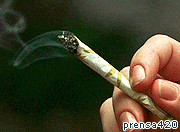Cannabis use in teenage years can double the risk of mental illness in the next decade, a major study has revealed.
The study, carried out by a range of European scientists, followed the lives of nearly 2000 young Germans over a ten-year period.
The authors of the study have concluded that using cannabis can actually induce paranoia and hallucinations.
Volunteers
The research team was made up of experts from the Netherlands, Germany, Switzerland and the UK and focussed on over 1900 volunteers, aged 14 to 24, none of whom had any history of psychotic symptoms.
After the initial research, the group was reviewed after three years and then eight years.
The study revealed that those who began to use cannabis for the first time during the study had double the risk of developing psychotic symptoms.
Psychotic episodes
The report states that cannabis “is the most commonly used illicit drug in the world, particularly among adolescents”, and goes on to say that its use “is consistently associated with mental illness, in particular psychotic disorder.”
Psychotic episodes among both users and non-users of the drug were then reviewed throughout the ten year period and the statistics showed that cannabis use “significantly increased the risk of incident psychotic experiences.”
Other factors likely to trigger psychosis, such as childhood trauma, social background and growing up in an urban environment, were also taken into account.
Findings
Reporting their findings in leading medical periodical the British Medical Journal (BMJ), the research team said: “Cannabis use precedes the onset of psychotic symptoms in individuals with no history of psychotic experiences.”
The article also stated: “Continued cannabis use might increase the risk for psychotic disorder by impacting on the persistence of symptoms.”
And the scientists found there was no evidence that psychotic symptoms themselves led to later cannabis use.
“Wall of evidence”
The study’s findings will be of significance to the debate as to whether the link between cannabis and psychosis is causal.
Sir Robin Murray, Professor of Psychiatric Research at King’s College, London, said the research was “one of ten prospective studies all pointing in this same direction”.
He went on: “This study adds a further brick to the wall of evidence showing that use of traditional cannabis is a contributory cause of psychoses like schizophrenia.
“It adds new information by showing that it is those who show psychotic symptoms within a few years of initiating cannabis use who are especially likely to develop persistent psychotic symptoms if they persist in their use of cannabis.”
Predisposition
Previous research has shown that 25 per cent of the population has a genetic predisposition which makes them ten times more likely to develop psychosis and other schizophrenia like symptoms, if they use cannabis.
In a BMJ commentary, Professor Wayne Hall from the University of Queensland and Professor Louisa Degenhardt from the Burnet Institute in Melbourne said that the link is biologically plausible and recommended that young people should be given more information about the risks.
“The case is strengthened by evidence that regular cannabis use in adolescence predicts poorer educational outcomes, increased risk of using other illicit drugs, increased risk of depression and poorer social relationships in early adulthood”, they said.
Concern
The research is likely to strengthen the widespread public opposition to the legalisation of the drug.
In January last year, the annual British Social Attitudes survey found that 58 per cent of people agreed that cannabis should be illegal.
Researchers concluded that the rise from 46 per cent in 2001 reflects “increased concern about its dangers”.
Reclassification
In 2001 almost half (46 per cent) of people surveyed said cannabis was less damaging than some people believed. But in light of widespread evidence linking it to mental illness the figure dropped to just 24 per cent.
Elizabeth Fuller, co-author of the official survey report, comments: “After 20 years, during which opinion has become more liberal, recent years have seen a return to a more restrictive view about cannabis.
“Its recent reclassification back to Class B appears to be in tune with this hardening of public attitudes, which seems to reflect growing concern about the impact cannabis can have on individuals and society as a whole.”

